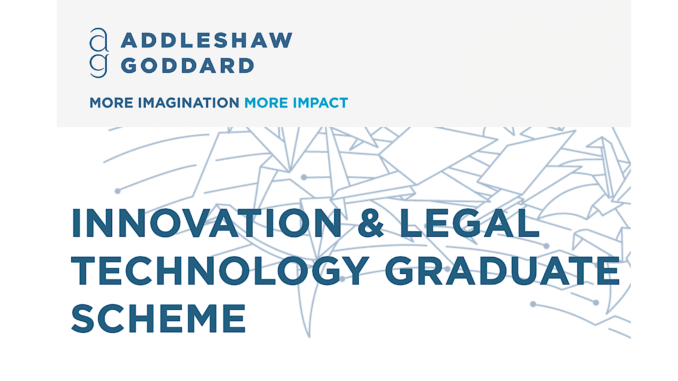
UK-based law firm Addleshaw Goddard is launching the second cohort of its two-year Innovation & Legal Technology (ILT) graduate scheme. Successful candidates will be able to take up positions in the firm’s Manchester, Leeds, Edinburgh and Glasgow offices. The positions carry a first-year salary of £25,000 ($32,800), rising to £30,000 ($39,400) in the second year.
The latest call for interest follows the success of the firm’s first 10-strong cohort. The firm said that the graduate scheme, which was among the first of its kind when created last year, is designed to ‘equip future legal technologists with the skills required to innovate the delivery of legal work including problem solving, legal design, process improvement, client engagement and consultancy’.
Kerry Westland, Head of the firm’s ILT function, said: ‘Our first intake of Legal Technologists only took up their first seats in November last year, but they have hit the ground running and the scheme is already beginning to deliver what we and our new technologists had hoped for.
‘Having led the way in this space since 2015, we have helped make it mainstream and its now one of the fastest growing areas in the profession. Until now, people have largely carved their own paths to create roles for themselves, but when you are considering a career it is important to know how you can progress.
‘Our scheme sets out a hugely rewarding and exciting career path with huge opportunities. It provides a training structure that allows careers in this space to be looked at in the same way other graduate careers are considered.’

The graduate programme consists of six, four-month rotations, which see the new Legal Technologists experience working in: Legal Tech Consulting; Research and Development; Client Projects; Products; Internal Efficiency; Document Lifecycle.
Below are some key points:
- ‘This is a two-year scheme with a job title of ‘Legal Technologist’ (level 1).
- You will rotate every 4 months through six of the seven ILT pillars, learning the different expertise that make up the ILT Team.
- As you come towards the end of the Scheme you will be asked to choose a pillar that is your preference to specialise in.
- Your preference will be taken into account as we assess your appropriate placement.
- The Senior Manager for your pillar will be your line manager in the ILT Team moving forward.
- Your job title upon completion will be ‘Legal Technologist’ (level 3).
- You will then proceed along our Legal Technologist career pathway, providing plenty of opportunity for career growth.’
The ILT scheme is open to graduates of any discipline, as well as those with legal tech experience who want to develop their career in the sector.
Elliot White, Head of Innovation & Legal Tech Operations at the firm, and who joined last year from Thomson Reuters, added: ‘We are passionate about providing new routes into the legal industry, devising innovative career paths that attract people who may not have considered or thought that a career in an international law firm was possible for them.
‘We are proud of what we have achieved with our first ILT graduate scheme, recruiting a group with diverse backgrounds and we hope to continue this trend in our subsequent schemes.’
Is this a big deal? It makes a lot of sense to build a dedicated legal technology capability from the ground up, rather than trying to convince a number of the firm’s lawyers – who by the look of it would be on much higher salaries – to give up the hour to work on legal tech instead.
The way that the firm has created a career pathway, with graded employee levels, is noteworthy, and shows that they are serious about building a long-term culture and capability around legal technology experts.
Anyone interested in the scheme can find out more here. The scheme will open for applications on 20 April with graduates set to start in September 2022.
—
P.S. In other legal educational news: LOD Launches SQE Programme
LOD, the alternative legal services provider, has launched a Solicitors Qualifying Exam (SQE) training programme designed specifically to develop skills suited for in-house legal work.
LOD trainees will train for the SQE in an alternative legal services environment while gaining up to two years of experience on assignment at some of the world’s leading companies.
Established in September 2021, the SQE offers an alternative route to become a qualified solicitor in England & Wales and provides greater access to the profession. People can fund their legal studies while in the work-place and no longer need to study law at university or complete a conversion course, such as the Graduate Diploma in Law (GDL).
The bespoke training programme also includes up to two years’ working experience with LOD clients. It combines appraisals and mentoring centred around the development of key skills identified by LOD as crucial to becoming a well-rounded in-house lawyer. Key components of the programme include drafting, communication advocacy and collaboration skills, as well as exploring broader topics, such as legal engineering, and legal career planning.